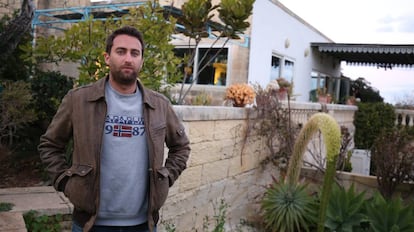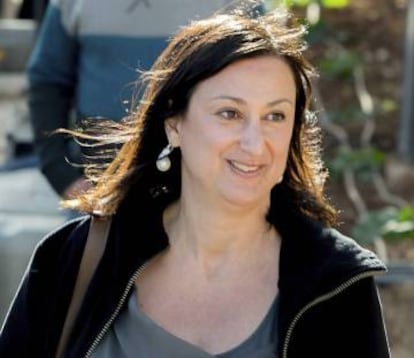The fight for justice for murdered Maltese journalist Daphne Caruana Galizia
In 2017, a car bomb killed the investigative reporter intent on exposing political corruption on the tiny Mediterranean island. A year and half later, it is still not known who was behind her death


Ann Demarco, 58, carries a backpack filled with candles and posters to the center of La Valeta, the capital of Malta. When she reaches the courthouse, she lights the candles and lays them with the posters in front of a nearby monument in a bid to keep alive the memory of murdered journalist Daphne Caruana Galizia, who was killed by a car bomb on October 16, 2017.
Demarco is a member of Occupy Justice, a small protest group made up of 20 women that formed shortly after the attack. “We can’t just return to normality as if nothing had happened,” she says.
On the posters are the words: “A murdered journalist: there is no justice.” Placing them by the monument along with the candles is a ritual that is repeated several times a day. If they are not taken down by an ordinary citizen during the day, they are swept up at dawn by the street cleaners.

Caruana Galizia was 53 when she was killed. On an island of 475,000 inhabitants, she was an outstanding journalist, dubbed by US journalism company Politico as “a one-woman WikiLeaks,” and whose potent, uncomfortable voice would not be silenced by threats as she worked to expose corruption scandals involving businessmen and politicians on her blog “Running Commentary.”
Her murder reverberated throughout Europe, where exposing the truth is assumed to carry no death penalty. As the investigation took shape, the European Parliament and other institutions began to question the rule of law on the island with regard to the police force, judges and the separation of powers.
Outside Daphne Caruana Galizia’s home, a policeman sits in his vehicle keeping an eye out. It is a rural area, surrounded by olive groves, half-an-hour’s drive from La Valeta. A couple of portraits of Daphne, piles of magazines and family photos are scattered around the living room.
Matthew, 32, her eldest son, heard the explosion from the dining room table. He was aware of the music playing from inside his mother’s car as it drove off and several minutes later, the bomb. He ran out barefoot and immediately grasped what had happened.
They want people to forget my mother and forget that we still don’t know who was behind her murder Matthew, 32, oldest son of Daphne Caruana Galizia
“It’s been almost a year-and-a-half since her murder and we still have no idea who was behind it,” he says. “And the police don’t know either. From where we are standing, it doesn’t look as though anyone’s making much effort to find out either.”
Three men, all with criminal records, have been accused of detonating the bomb, but they are believed to have acted as mere foot soldiers. According to Matthew, it is “very probable that whoever was behind the murder has links to the Maltese government or works in it.”
Matthew adds that no members of Joseph Muscat’s labor government mentioned in relation to corruption in his mother’s blog have been questioned, not even the minister who was seen in a bar with one of the accused after the explosion.
Matthew is now demanding a public investigation, which involves a commission that has to be authorized by the government. It would establish the circumstances in which the murder took place and whether or not the state could have prevented it.
When Caruana Galizia was murdered, she was facing 46 defamation suits, which her children have inherited
According to Dutch Member of the European Parliament (MEP) Sophia In’t Veld, there was concern among her colleagues about Malta, but few were aware of the extent of the problem until Daphne Caruana Galizia’s murder.
At the end of March, the European Parliament is due to submit a proposal to the plenary session, backing the request of the family to open a public investigation into the journalist’s death and send a strong political message to Malta.
In’t Veld led the second mission of MEPs to the island to investigate the murder and the extent to which the rule of law was being upheld. The result was an alarming report that forms the basis of the draft resolution.
She criticizes the Maltese authorities for not using all the resources at their disposal in the murder investigation. “For example, they claim to have asked for the information from Caruana Galizia’s computer from Germany but the German police have received no such official request,” she says in a phone interview.
Other aspects of the case have also alarmed Strasbourg. “We are seeing corruption, the sale of passports, money laundering, conflicts of interest,” adds In’t Veld. “A lot of illegal, suspicious and shady activity connected in some way to government circles.”
In the draft resolution, the Maltese government is being asked to open an investigation into the connection between the head of the Cabinet and the tourism minister with a Dubai company called 17 Black. This is a story Caruana Galizia had started investigating, and which has since been taken up by Reuters and other news organizations as part of the Daphne Project, a group that was formed to finish her stories in progress.
They turned her into a scapegoat, someone to laugh at, because if you discredit the journalist, it is very easy to say everything she wrote was a lie Pia Zammit, member of Occupy Justice and Republika
A Maltese government spokesman has stated that a public investigation into the murder will be opened once the criminal investigation is concluded to avoid the latter being compromised. He also insists that the police are already investigating 17 Black, though does not specify whether this covers its links to the government.
The draft resolution also contains a request to the Maltese government by the European Parliament to dispense with the controversial program of investment in return for citizenship, which opens the gates of Europe to “all kinds of shady characters,” as In’t Veld puts it.
The Dutch MEP believes it is “immoral” that Europe is returning migrants adrift in the Mediterranean to Libya while allowing for the purchase of European citizenship “if you are a Russian criminal.”
But the influence of Strasbourg is limited. “We don’t have all the power we need but we can keep up the pressure,” says In’t Veld. “It’s essential that we create a control system at a European level, a mechanism that can evaluate the democratic situation, the basic laws and the rule of law in each member state every year.”
Hate campaign
All this focus on Malta and the murder of Caruana Galizia from Europe contrasts sharply with the abuse reported by those asking for justice on the island. Both Occupy Justice and Il Kenniesa, a small youth organization, organize vigils, apply pressure and take flowers and candles to the monument in front of the courts. Both groups criticize the hate campaign directed against the journalist’s memory as well as abuse against those who are trying to keep it alive, both online and on the street.
Although there are only a handful of them, these activists believe they have the tacit support of many people who are scared to be identified in a country where everyone knows everyone and where the politics are deeply polarized. “They turned her into a scapegoat, someone to laugh at, because if you discredit the journalist, it is very easy to say everything she wrote was a lie,” says Pia Zammit, a member of Occupy Justice and Republika, an NGO that aims to broaden the scope of the fight for the rule of law in Malta.
The European Parliament is backing the request of the family to open a public investigation into the journalist’s death
When Caruana Galizia was murdered, she was facing 46 defamation suits, which her children have inherited. One lawsuit was filed by the prime minister, who refuses to withdraw it until the family publicly states that what Caruana published – that his wife had a company in a tax haven – was untrue. The government spokesman insists that an official investigation has discredited the journalist’s accusations and that Muscat “has the right to clear his and his family’s name.”
The battle of the flowers and candles is just one example of the toxic atmosphere surrounding the case on Malta. The activists claim the justice minister has ordered the street cleaners to sweep the tributes away and that this has encouraged others to follow suit. “They also insult us and shout at us. They even hit my wife,” says Manuel Delia, a recognized blogger and founder of Republika.
But the government takes a very different view. According to the spokesman, the posters and candles have apparently caused great offense to some of La Valeta’s citizens, placed as they are at the foot of a monument dedicated to the victims of the 1565 Ottoman siege. And it is they, not the street cleaners, who have taken it upon themselves to remove them.
The spokesman adds that the government is not opposed to a memorial to Caruana Galizia but permission needs to be sought. “In order for the rule of law to reign,” he says, “you have to comply with the law.”
“All this speaks volumes about the government and the state’s attitude,” says Matthew. “They want people to forget my mother and forget that we still don’t know who was behind her murder.”
English version by Heather Galloway.